Starring: Lily-Rose Depp, The Weeknd, Hank Azaria, Da’Vine Joy Randolph, Rachel Sennott, Eli Roth, Troye Sivan, and Jane Adams
Grade: C-
Despite atrocious reviews and an early cancellation after one eventful, five-episode season, The Idol never bores. Though it suffers from clichéd writing about the evils of the music industry and Hollywood, an excessive amount of sexual content that doesn’t seem as necessary as creator Sam Levinson thinks it is, and The Weeknd not being the charismatic dynamo he needs to be, The Idol did enough to intrigue with its narrative and style. Even with rightful criticism directed towards the show, I do think it was cancelled just a tad too early. This first season was just an introduction into the visceral world of entertainment and getting a chance to explore this landscape further, while fleshing out certain plot developments in a second season, could have been worthwhile. Is this a controversial thing to say? I understand I’m in the minority, but I can’t sit here and lie to you by saying Sam Levinson didn’t captivate for its relatively small run.
The series takes place in Hollywood and is centered around Jocelyn (Depp), a superstar pop music artist who is about to embark on a big tour headlined by her new, very commercial single “World Class Sinner”. It’s going to be huge for her, as she’s been inactive for the last year following her mother’s death. The question surrounding the pop princess is if she has recovered mentally from it. Truthfully, she hasn’t, but she has never been able to face the issue head on. Mental health isn’t a focus of her team. As you would expect, the label executives are only focused on how to make money off the issue rather than actually helping their star. Executive Nikki Katz (Jane Adams) tells creative director Xander (Sivan) and Jocelyn’s manager Chaim (Azaria) that mental illness “is sexy”, and it can work to their benefit in the case of Jocelyn (Pop Tarts & Rat Tales). Additionally, Jocelyn’ publicist Benjamin (Levy) points out that they are trending on Twitter when an embarrassing photo of her is leaked, so it’s inherently a good thing. So, as much as we are worried for our protagonist and how she’s clearly not okay, we are only worried further because a portion of her team have ulterior motives. This opening conversation in the first episode is a good tone-setter, despite everything spoken from Nikki being cliché and something we’ve seen before in satire-based productions regarding the entertainment business as a way to show off the cold-heartedness and inhumanity of those in power. Regardless of this, someone has to play this role in the show, and Nikki’s characterization is this to a T. Being one of the more powerful figures behind the scenes, she has a big metaphorical dick, and she swings it around as often as she can.
Despite acting like she’s making decisions in Jocelyn’s best interests, Nikki’s ruthlessness and unwillingness to hear anyone out is pretty much what you would expect, as evidenced by her immediate reaction to Jocelyn’s reworking of the ready-made single to make it more meaningful to her, with Nikki giving her the expected “We made you. Eat shit.” argument (Double Fantasy).
Nikki can take it or leave it with Jocelyn and is very over her mood swings, furthering her ruthlessness as a person. The supposed last straw becomes the eventful music video disaster where Jocelyn freaks out over numerous issues regarding the set, her costume, and her own personal performance (Double Fantasy). It’s not looked at as one of those stories about a musician being some incredible talent who strives for perfection. No, Jocelyn is looked at as difficult and unprepared, which does a lot of damage to her increasingly poor reputation and general well-being, as she notices the reactions she’s getting from the crew and director. Basically, Nikki doesn’t see Jocelyn being worth the trouble anymore and is looking for an out. After an emotionally startling scene where the panicked superstar starts to weep and calls out for her deceased mother as if she were there in the flesh (and denying it right after to Chaim), Nikki’s eyes glance over at Dyanne (Jennie), who’s outdancing everyone on the set including Jocelyn. The ego of Nikki is very much that of a music executive who thinks she knows more than everyone. With the most frustratingly accurate moment stemming from Nikki telling the writer from Vanity Fair, who has been covering the events of the first season and is a fan of Jocelyn in Talia Hirsch (Hari Nef), that she’s about to have another big story. It just shows the quick turnaround of the music business and the seedy execs always looking for the next big thing and seeing it in Dyanne. They promise to make her a star, they promise to give her Jocelyn’s single, and they just want her to re-record the vocals, with Nikki willing to redirect the entirety of the “machine” to go all-in on someone else.
Honestly, it’s really that quick. As big of a star as you can become, you can lose it all tomorrow when you have these types of people running things in the background. This is a big part of The Idol and what they try to shine the spotlight on. It’s the dark side of stardom, celebrity life, and the corruption involved with the people who pull the strings.
More than likely mirroring The Weeknd’s disillusionment with the music industry, The Idol intends to satirize the paranoid and cruel aspects of the music industry from management to talent, and there are a lot of instances where it does work. Jocelyn’s management team of Chaim and Destiny (Da’Vine Joy Randolph) openly talking about killing Tedros, and Chaim considering it for a second is a funny moment, but it’s more than that. As you smirk at the comment, you start to think about the millions at stake and the people involved. Hypothetically, something like this could actually happen. These people are very powerful and very toxic. In the opening minutes of the first episode, Chaim traps an intimacy coordinator in the bathroom and pays a guy $5,000 to hold the door shut until the photoshoot is over with. When people have money, they can get what they want more often than not. Ironically enough, Chaim and Destiny are two of the only people who have their head screwed on straight in comparison to the others, which only shows you how fucked up this show can and tries to be. Out of the supporting cast, Hank Azaria and Da’Vine Joy Randolph are beacons of light in this five-episode tornado of a sadist fantasy. They act as pseudo parent figures and though they are a part of Jocelyn’s management team, you do get a sense that they actually care about her, along with wanting her to be focused on her music career. They’re great in scenes when they work on plans together and mess with guys like Live Nation representative Andrew Finkelstein (Roth), your typical, anxiety-riddled Jewish executive whose lines consist of force-fed references and nonstop quips for the entirety of the show. For the record, some land but most don’t.
He got me when he called Tedros “Scarface Miyagi” though. If you’ve seen the show, this is a hilariously accurate insult.
When Destiny basically goes “undercover” at Jocelyn’s house to act like she’s cool with everything going on to get more insight on Tedros (The Weeknd) and his crew of talented followers, it’s one of the better parts of the show. Da’Vine’s subdued reaction to the chaos gives us some of the funnier moments in the show, not counting all the unintentionally funny moments.
Of course, when I talk about the unintentionally funny moments, I’m mostly talking about anything involving The Weeknd’s performance as the villain in Tedros. Personally, I like The Weeknd’s ambition and him wanting to branch out as a crossover star. With the Safdie Brothers’ Uncut Gems under his belt in terms of acting experience and his well-developed music videos and narrative-driven albums, he’s shown an ability to tell stories. I understand him wanting to shed the label of The Weeknd, so he can make the name of “Abel Tesfaye” something special. However, stupid stage name or not, he shouldn’t have given himself this important of a role right off the bat. The character of Tedros is the reason to tune into the show. Despite all the music industry stuff, the devilish presence of the series antagonist and his creation of an unofficial cult is why The Idol is supposed to be this wildly entertaining and unhinged show. The character is written well, but the performance is not what it needs to be. First of all, you need to be full of charisma and showcase a personality that is willing to attract immediately from a first impression to make sense as to why he has such a big following of people who listen to anything he says. The reveal of his sadistic tendencies needs to be gradual, with him only showing certain subtilties to show he’s not some regular nightclub owner. Instead, they opt into the weirdness a little too early and it comes off as cartoonish. There’s no nuance to his performance at all. Everything is straightforward and less believable as a result.
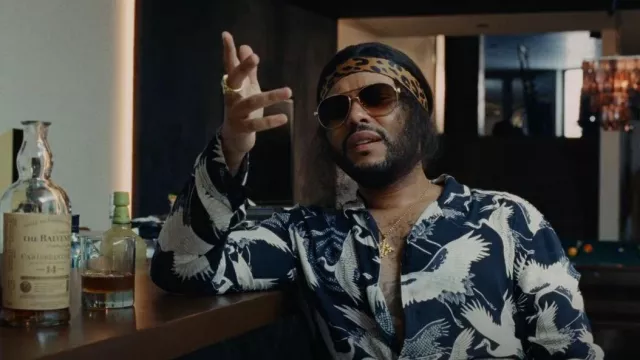
The subtle details of the character’s personality and tendencies is something any experienced actor could have had a lot of fun with, but The Weeknd blows the opportunity completely. From his entrance into Jocelyn’s house, to playing a few piano keys in her home as he makes eye contact with Leia (Sennott), to wearing a trench coat in general, anyone can see there’s something wrong with this idiot. Leia is right when she talks about how much she hates his vibe and how he’s “rape-y”. It’s pretty obvious from the get-go.
As mentally unstable as Jocelyn is (she does admit that’s what he likes about him, albeit jokingly), you have to give me a little bit more of Tedros being somewhat of a surface-level casanova for us to believe he’s able to bag her so quickly. Even if The Weeknd may be good at it in real life, I didn’t see it whatsoever in Tedros. He’s not charismatic, he’s not cool, and he doesn’t possess the quality of someone who’s this leader who’s managed to inspire and make so many people believe in his fucked-up vision. When it’s finally time to show Tedros’s not-so-subtle hidden aggression, it comes off as laughable. Again, his performance gives us the funniest moments of the show because of how “off a step” he is as this “threatening” presence. For instance, the “Let me catch you looking at her again” sequence where he gets into it with a clothing salesman on Rodeo Drive is vital as a make-or-break scene for the character and the rest of the show, but it’s hysterical. His line delivery is fumbled, and it looks like he’s trying to think it out as he goes, directing empty threats right into the guy’s ear. He doesn’t come off as a menacing cult leader looking for a reason to snap to show off his power in the eyes of the audience, especially because we are led to believe he’s this unstoppable menace up until this point. Instead, he comes off as an inexperienced actor. In this moment, we are reminded that this is The Weeknd and not the wicked Tedros, which is the exact opposite of what you should do as an actor. In doing so, the character begins his decline in credibility, which is only heightened in the outrageously funny lines fed to him for the sex scenes involving him and Jocelyn.
I haven’t seen the heat of a sex scene leave the room so quickly when The Weeknd tells a blindfolded Jocelyn to “Imagine my tongue on your pussy, my fat tongue. I wanna grab you by the ass while I suffocate you with my cock”. By the time he said “fucking stretch that tiny little pussy” with this plain expression and unemotional, dead-eyed stare, I was bursting with laughter. Again, Tedros is supposed to exude sex to the point where just his voice can make Jocelyn wetter than Aquaman, but I just don’t see it from The Weeknd’s performance. Even so, it’s never boring. There’s still a lot of entertainment value in this production, even in the rougher parts. Also, in his defense and Sam Levinson’s, this weirdo, sadomasochist approach to the sex scenes did work effectively at the end of “Pop Tarts and Rat Tales“. However, anytime we see glimpses of what Tedros could have been like when he turns the downstairs area into a dungeon-like atmosphere and when he hits Xander with the shock collar (Stars Belong to the World), we see scenes where he undoes it just as well like when he’s apprehended by Chaim’s security in this climactic moment and tries to feign a struggle but brings 1/5th of the energy he should. The role of Tedros is just one massive, missed opportunity that should have been played by someone else. The character was written well and was given a lot of decent material to work with, but The Weeknd wasn’t ready for the responsibility that came with it. I mean he couldn’t even jerk off believably. Are you kidding?
On a side note, Tedros was low-key right about slapping Andres even if he is Jocelyn’s personal chef. You can admire her abs from afar my dude.
Jocelyn’s assistant and best friend Leia is another one of the very few decent people in the star’s life, but her inability to speak up when needed, as well as not having a strong enough personality in the moment to make a difference leaves a lot left to be desired. Basically, she’s a bystander who represents the audience’s reaction. She wants to look out for her friend in Jocelyn but continues to lose grips on the situation after being the only one who initially notices the problem Tedros is going to be. Plus, she gets distracted too easily. Leia would’ve benefitted the most from a second season because her character only scratched the surface. I would’ve loved to see her face once she saw Jocelyn got back with Tedros (Jocelyn Forever). Rounding out the cast is Tedros’s strange but extremely talented followers like the extremely creepy Izaak (Moses Sumney), the 17-year-old former heroin addict and piano playing singer Chloe (Suzanna Son), and the odd-looking Ramsey who just plays herself. I don’t know if this means anything, but they play devoted followers to a cult effectively, especially Izaak who’s single, dyed eyebrow I can’t seem to forget. Honestly, he may have had a better argument of being the cult leader over Tedros. When he tells Leia that Jocelyn “…is not a human being. She’s a star, and stars belong to the world”, you get more of a sense of a danger than anything The Weeknd says.
Lastly, there’s Jocelyn’s creative director who’s lived with her since he was 14 years old in Xander, played very well by real-life singer Troye Sivan. His acting ability should not go unnoticed. Xander’s job isn’t taken seriously, and he accepts it at first but his unraveling at the hands of Tedros, as well as the reveals involving the character in relation to Jocelyn’s “cunt of a mother”, becomes a captivating side story that add a lot to the secrets behind our protagonist. Honestly, Sivan’s Xander is the most underrated part of the show and is yet another example as to why this show should have gone into a second season at the very least. His growing involvement in the Tedros/Jocelyn relationship was just scratching the surface of how bizarre and chaotic The Idol was becoming once he screwed Jocelyn’s ex-boyfriend Rob (Karl Glusman) with that picture to make him lose his movie deal after getting Rob accused of rape. It was just another frightening example of what is possible in the entertainment industry when someone is out to get you. Again, you can be a star in one moment and lose your entire career in the blink of an eye. Such as the case with The Idol.
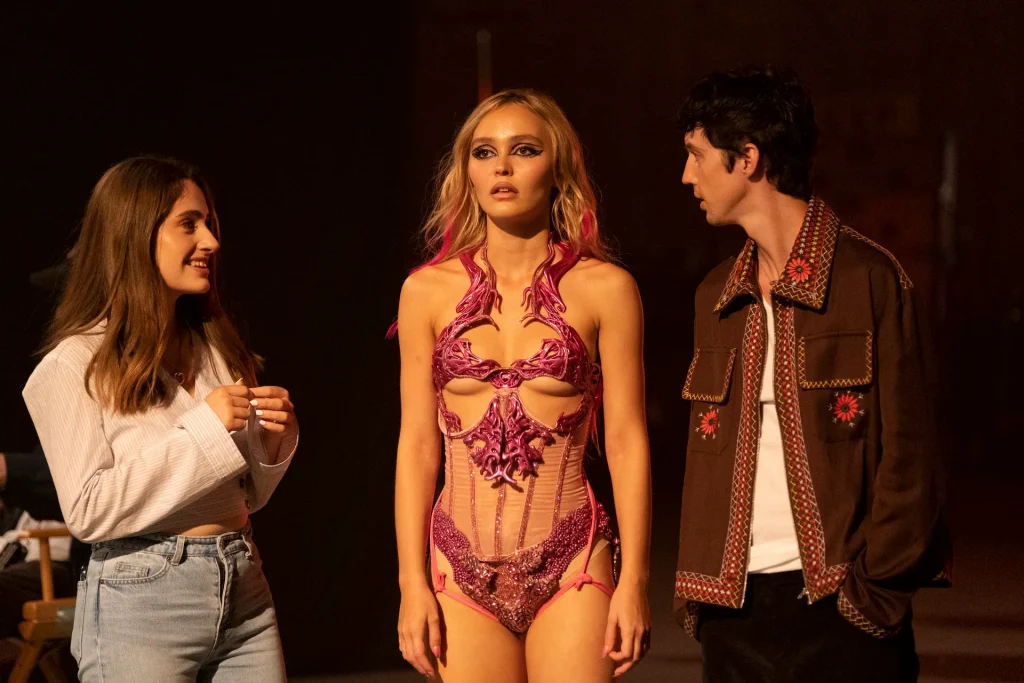
Regardless of the problems regarding the show, I’m confident in saying that Lily-Rose Depp is a star in the making. From start to finish, she handles this show and the complexities of Jocelyn with professionalism, unpredictability, the nuanced performance we were looking for, and a full understanding of who the character is. Though I probably could have gone without her choking herself while masturbating, I guess it’s just a way of showing how secretly off-center she is and why she’s attracted to the equally odd Tedros. Despite being as troubled as she is, we like Jocelyn. Even with the embarrassment of the photo going viral of her getting jizzed on, everyone referencing her previous and very public psychotic break, and the pressure to succeed and stay relevant, she is faced with a lot to overcome. Being in the public eye can do that, especially for someone as young as she is. She knows she’s being watched by everyone too, though they all continuously lie to her and downplay any issues, as is the life of a celebrity. People want her to fail, and she’s starting to crack as she realizes it. The problem is that she cares too much about what people think (Daybreak), and it’s affected her personally and as a “once-in-a-generation artist” who wants to make “music that lasts longer than my life” (Double Fantasy). In doing so, she wants to make things better but overthinks things and crumbles under the pressure, with Chaim reminding her how important the music video is and that if she fails, the executives are going to start wondering if they can still trust her.
Depp does a wonderful job at conveying these emotional aspects, and the raw sexuality she brings in the role really works for the graphic intent of the show. If she had a better dance partner than The Weeknd, it could’ve been something else.
Jocelyn is an artist who’s struggling with the death of her mother. It’s understandable, and her inability to overcome this, with a few breakdowns throughout the show, endear her to us, especially when we find out about the abuse she suffers at the hands of her mother, and the fact that she actually misses the motivation it gave her (Daybreak). Because of the cancellation of the show before we delved into things further, I’m still a bit confused to the actual details of it though. A big part of the season finale (Jocelyn Forever) is when it’s revealed that she was just using Tedros for inspiration and when he brings up the hairbrush her mother used to beat her with, he sees that it’s brand-new. She just smiles, and he’s in shock. Are we supposed to believe it never happened and she was lying about this? If so, this doesn’t make sense because she was suffering over her mother’s death both publicly (potentially costing her money) and privately (which she would have no reason to do if she was lying about it). This is why the ending of the season ends on such a sour note because not enough is said, and The Weeknd’s confused expression doesn’t tell us enough of what actually happened between them and what Jocelyn’s true intentions were. Is he now stuck as her muse, and we’re supposed to feel bad for him (a near impossibility after getting to know this maniac)? Her final turn doesn’t make sense at the end either when she says it didn’t mean anything without him. She used him plain and simple. You can’t make one big reveal at the beginning of the episode be that she used him for inspiration and dropped him like it was nothing, and then at the end bring him back and say that he meant everything. The only explanation is that she just wants to use him again for further inspiration for future projects, but what’s the fun in that? Also, she doesn’t need any more source material because this tour will occupy most of the year. She doesn’t need to make any new music, so she doesn’t need him, at least at the moment.
This only furthers my point of why this ending doesn’t make sense and not enough is explained in the finish for us to understand it. Tedros having this plan for years totally makes sense, but Jocelyn’s true intentions are unknown by the end. Are they just both toxic people that belong together? Were they both going to team up and endanger more talent in the future and breed further stars in some Illuminati type way? Honestly, as crazy as these possibilities are and how weird this show was, I would’ve liked to see the entirety of Sam Levinson and The Weeknd’s vision. They did enough in five episodes to get that response about me, so that’s not nothing.
The music throughout the show is really good. Since this is a show about a pop artist, it needed to have good enough music for us to suspend our disbelief about Jocelyn being this superstar musician. Without a doubt, they did this. From the commercial “World Class Sinner” to the remix of it, to the final song that sold Finkelstein (“Dollhouse”), the score of The Idol is filled top to bottom with absolute bangers.
With not a lot to choose from, the best episode is the tone-setting introduction where we get a lot of fun with the dirty execs, the everyday life of what Jocelyn has to go through, and the awesome shots in and out of the gorgeous mansion she lives in (Pop Tarts & Rat Tales). The other best episode is when we see Tedros’s influence start to take over to a frightening degree (Daybreak).
Also, Mike Dean gets a shout out for being as naturally abnormal as he is without even trying, truly a tough thing to do.
It’s sleazy, it’s weird, it’s beautifully shot, and it’s wonderfully fascinating, though you’re not sure if it’s fascinating because of the narrative or because of thoughts like “What the fuck were they thinking?” come into your head. The script doesn’t say anything new, certain plot developments don’t make any sense, the performances aren’t good enough, and the ending yields too many questions to satisfy, but I did want more. It’s a slow-moving show in general, so there’s a good chance it would’ve gotten better as more was explained in subsequent seasons. Additionally, the cult-like vibe is an engrossing one and Lily Rose-Depp is very impressive as the star. She has a bright future. Unfortunately, the series’ co-creator is the reason The Idol isn’t that good, so the ceiling was evident. Regardless, don’t deny yourself an experience, as Izaak says. This one is outlandish enough to make you want to tune in.
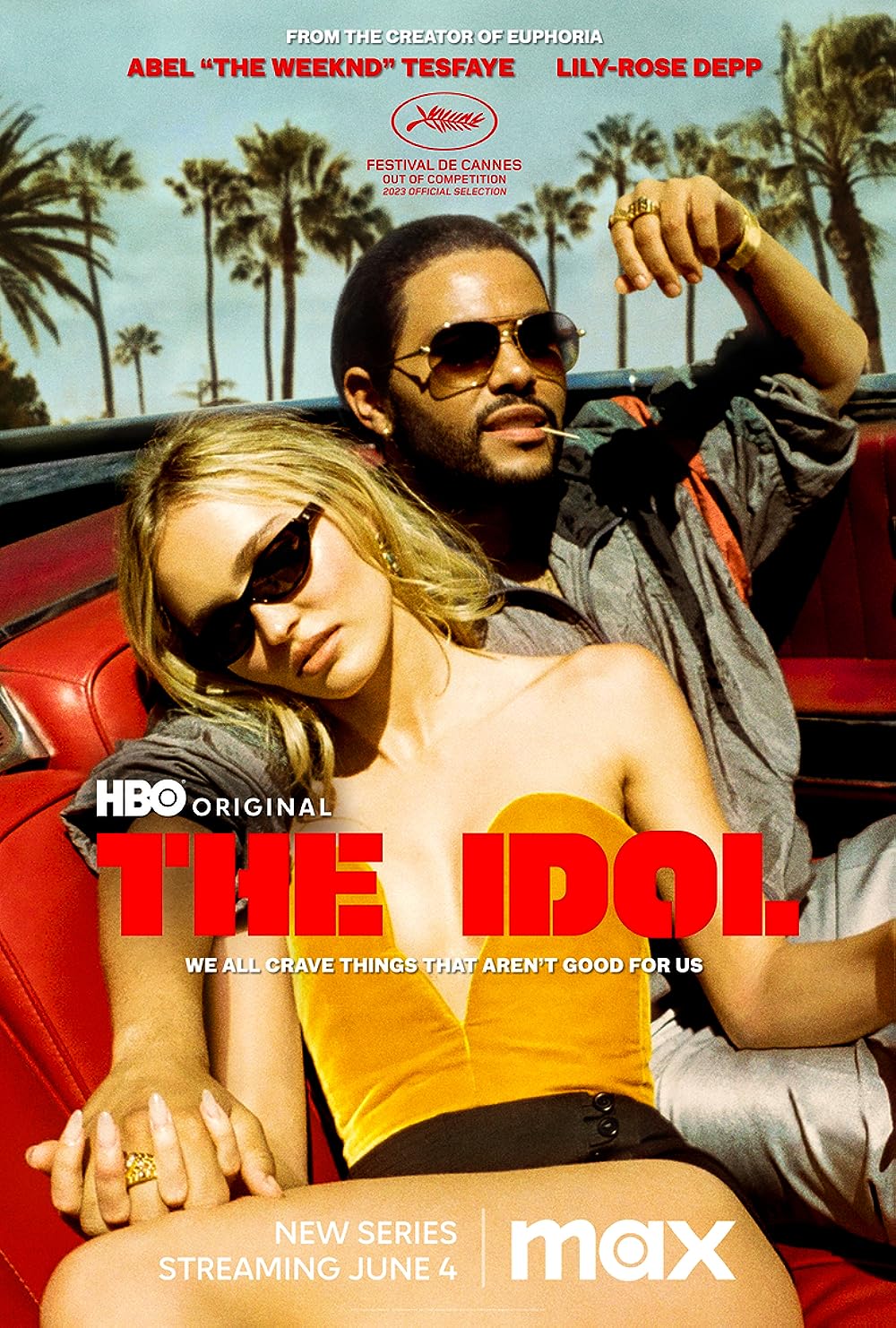
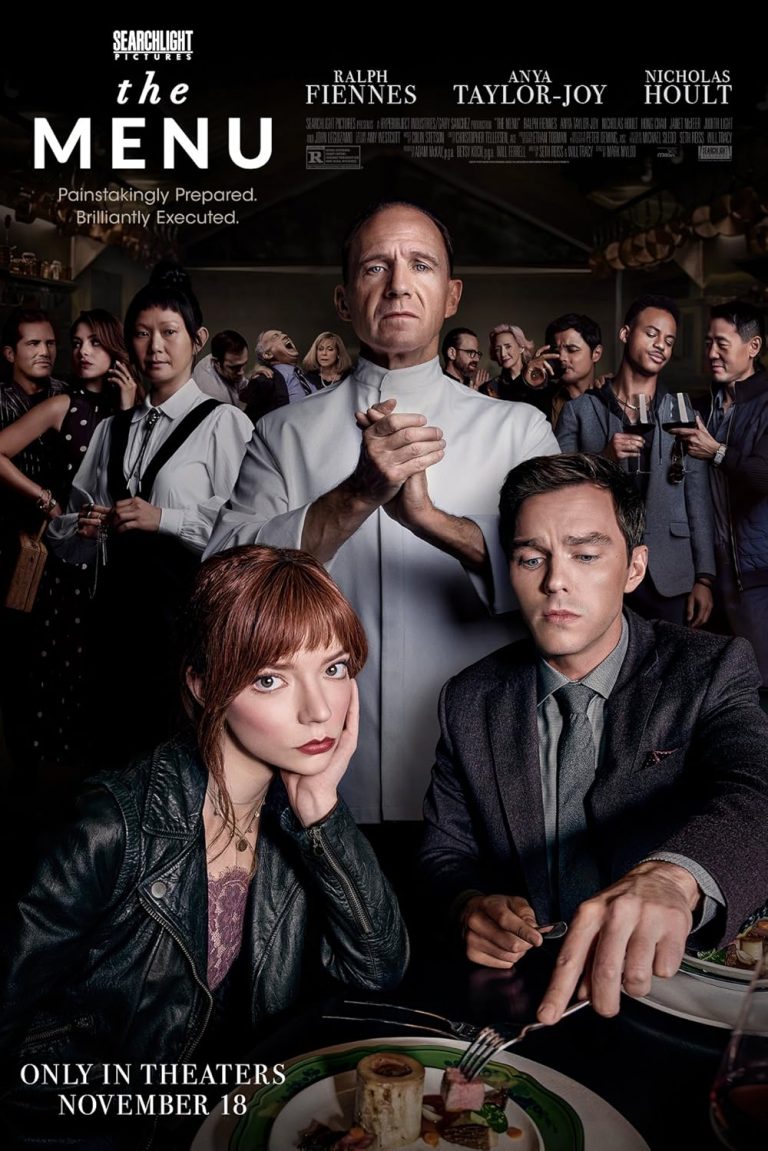
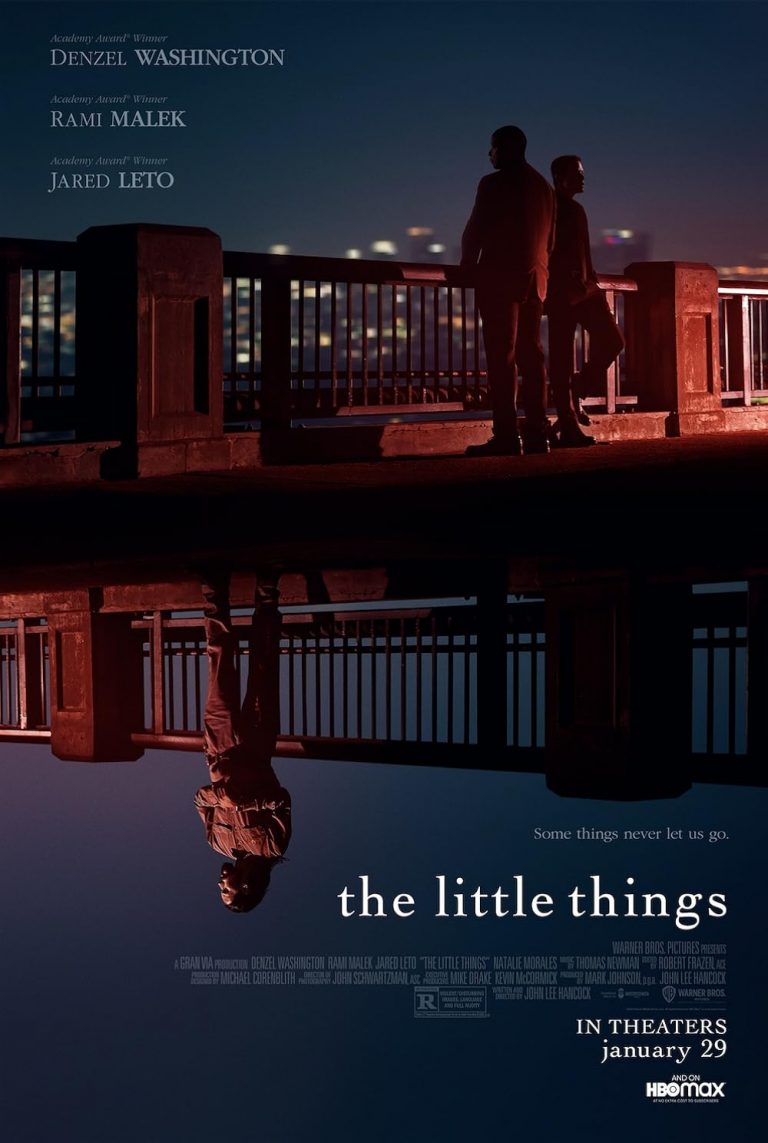
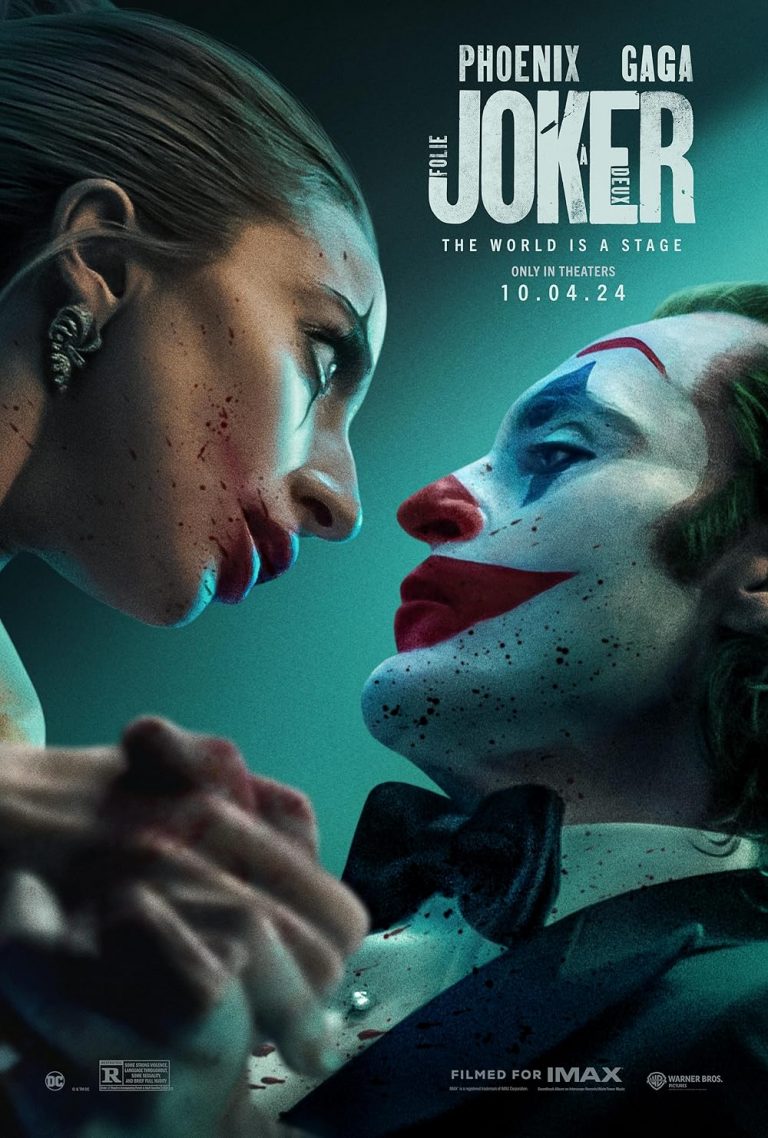

+ There are no comments
Add yours